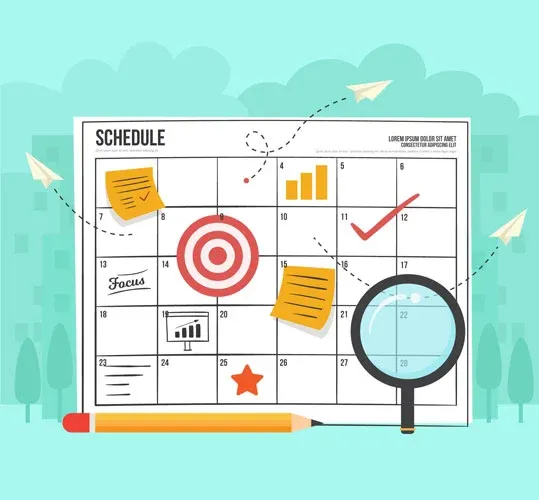Managing time effectively can seem like an impossible task for high school students. In this blog, we discuss the importance of time management for high school students and share actionable tips to help them make the most of their time.
We explore practical strategies, advanced techniques, the role of technology, and how parents can support their children when they struggle with time management. Additionally, we highlight how some charter schools, like Rose Academies, provide a flexible education model that helps students manage their schedules more effectively to maintain high academic standards.
Contact Rose Academies today and see how our personalized approach to learning supports time management skills for high school students, enhancing your child’s success and well-being.
Understanding the Importance of Time Management
Time management is a critical skill for high school students, enabling them to juggle academics, extracurricular activities, and personal responsibilities. Developing good time management habits early on can lead to better performance, reduced stress, and a more balanced life. By mastering this skill, students can achieve their goals more efficiently and enjoy a healthier school-life balance.
Why Time Management Matters for High School Students
Effective time management allows high school students to prioritize their tasks, ensuring they meet deadlines and maintain quality academic performance. For instance, a student who plans their study time around sports practice after school can excel in both areas without feeling overwhelmed.
Additionally, managing time wisely helps students allocate periods for rest and recreation, which is essential for mental and physical well-being. At Rose Academies, our flexible scheduling options encourage students to learn these vital skills to provide a conducive environment for academic and personal growth.
Practical Tips for Effective Time Management for High School Students
Strong time management skills can enhance a student’s productivity and reduce their stress. By incorporating a few practical strategies, high school students can better organize their schedules and achieve a more balanced life. Here are ten time management tips to help high school students be effective with their time:
1. Have a schedule
Creating a routine daily schedule helps students allocate specific times for study, activities, and rest. For example, a student might set aside 4 PM to 6 PM daily for homework, ensuring they have consistent study time before playing video games. This daily or weekly schedule routine makes it easier to stay on track and reduces last-minute cramming.
2. Use your planner
A planner can keep track of assignments, tests, and extracurricular activities. By writing down due dates and breaking complex or challenging tasks into manageable steps, students can avoid the stress of forgotten deadlines. The practice of using your task planner regularly also helps in visualizing the workload and planning accordingly.
3. Don’t get sidetracked
Staying focused is essential for effective time management. Whether we realize it or not, humans are not great multitaskers; what we often think of as multitasking is actually “task switching.” This means we give less attention to each task while trying to manage others running in the background.
To master time management for academic success, focus on one project at a time before moving on to the next. For instance, working in 25-minute intervals with 5-minute breaks can maintain concentration and productivity, reducing the temptation to switch tasks frequently.
4. Make a To-Do List
A daily to-do list is a powerful tool for prioritizing tasks and managing time efficiently. By listing tasks in order of importance, students ensure that critical assignments are completed first. Creating and following a to-do list organizes the day and provides a sense of accomplishment as each task is checked off, boosting motivation and productivity.
5. Always Have Your Work Handy
Keeping schoolwork and study materials accessible makes it easier to utilize free time effectively. Using a mobile app for note-taking or carrying a textbook ensures that even short periods, like waiting for a ride, can be used productively. This habit turns idle moments into valuable study opportunities, enhancing overall efficiency.
6. Learn to Say No
Learning to say no to additional commitments helps maintain a manageable workload. For example, declining extra social activities during the week of mid-term exams ensures that study time remains a priority. Learning this skill and the importance of balance helps prevent burnout and keep your focus on essential tasks, promoting better academic performance and well-being.
7. Identify Your Most Productive Times
Understanding when you are most alert can optimize study sessions. Some students are more productive in the morning, while others prefer evenings. By scheduling demanding tasks during peak productivity times, students can enhance efficiency and retention, making the most of their natural energy levels.
8. Budget Your Time Wisely
Allocating specific time blocks for different activities ensures that no single task dominates the day. Setting a timer for 90-minute study sessions with breaks can prevent fatigue and keep the mind fresh. This structured approach balances work and relaxation, leading to more effective use of time.
9. Establish a Dedicated Study Routine
Having a consistent study routine helps reinforce good habits. Designating a specific place and time for studying reduces procrastination and creates a focused environment. For instance, studying in a quiet room at the same time each day can improve concentration and productivity.
10. Ensure Adequate Sleep
Adequate sleep is needed for cognitive function and overall health. High school students should aim for 8-10 hours of sleep each night. Prioritizing sleep over late-night studying or watching TV can enhance memory retention and academic performance, leading to better outcomes in both school and personal life.
Advanced Time Management Strategies for High School Students
High school students can adopt advanced time management strategies to further enhance their skills. By setting specific goals, creating effective study environments, and utilizing advanced planning techniques, students can optimize their time and achieve better academic results.
Here are some advanced strategies that can make a real difference in a high school student’s daily life:
Setting & Achieving SMART Goals
Setting SMART (Specific, Measurable, Achievable, Relevant, Time-bound) goals helps students focus their efforts and track their progress. For instance, instead of aiming to “study more,” a SMART goal would be to “study biology for 30 minutes every day for the next two weeks.” This clarity makes it easier to stay motivated and assess success.
Avoiding Procrastination
Procrastination can derail even the best plans. Breaking tasks into smaller, manageable parts can make them seem less daunting and reduce the urge to delay. Setting short deadlines for each part can help maintain momentum and ensure steady progress.
Creating an Effective Study Space
A dedicated study space free from distractions can significantly improve focus. This area should be well-lit, organized, and equipped with all necessary materials – and no, that does not count the TV in your room. A consistent study environment signals to the brain that it’s time to work, enhancing concentration and productivity.
Breaking Down Large Tasks
Large tasks can be overwhelming, but breaking them down into smaller steps makes them more manageable. For example, a research paper can be divided into stages: selecting a topic, conducting research, outlining, writing, and revising. Tackling each step individually can make the entire project less intimidating.
Learning Time Estimation
Accurately estimating the time it will take to complete tasks is an important skill to learn and master. Students can practice this by timing their tasks and comparing the actual time taken to their estimates. Over time, this practice improves their ability to plan realistically and avoid overcommitting.
Time Blocking & Time Mapping
Time blocking involves scheduling specific blocks of time for different activities throughout the day. This technique ensures that dedicated time is set aside for each task, reducing the likelihood of tasks spilling over into each other. Time mapping, a visual representation of how time is allocated, can further help students manage their schedules and identify areas for improvement.
Utilizing Tools & Resources
Effective time management often hinges on the proper use of tools and resources. By leveraging planners, reminders, and customizable schedules, students can better organize their time and prioritize tasks. Incorporating these tools into daily routines can enhance your productivity and overall well-being.
Using Planners & Calendars
Planners and calendars are essential for tracking assignments, deadlines, and activities. A well-maintained planner helps students visualize their commitments and plan their time effectively. Digital calendars can also sync across devices, providing reminders and alerts to keep students on track.
Setting Reminders
Setting reminders ensures that important tasks and deadlines are not forgotten. Using smartphone apps or digital assistants, students can set alerts for study sessions, project due dates, and extracurricular activities. These reminders act as prompts to stay focused and organized throughout the day.
Customizing Your Schedule
Customizing a schedule allows students to tailor their time management strategies to fit their unique needs and preferences. This might include blocking out time for specific subjects, extracurricular activities, or relaxation. A personalized schedule helps maintain a balanced lifestyle and reduces the risk of overcommitting.
Prioritizing Tasks
Prioritizing tasks involves ranking assignments and activities by importance and urgency. Students can use techniques like the Eisenhower Matrix to decide what needs immediate attention and what can be scheduled for later. Prioritizing helps ensure that critical tasks are completed first, reducing stress and improving efficiency.
Balancing Fun & Self-Care
Balancing fun and self-care with academic responsibilities is crucial for maintaining overall well-being. Scheduling time for hobbies, exercise, and relaxation helps prevent burnout and keeps students motivated. Incorporating breaks and leisure activities into the daily routine can improve focus and productivity.
Seeking Support
Seeking support from teachers, parents, and peers can provide valuable assistance and guidance. Students should not hesitate to ask for help when needed, whether it’s for understanding a difficult concept or managing a heavy workload. Support networks can offer practical advice and emotional encouragement.
Maintaining Flexibility
Maintaining flexibility in schedules allows students to adapt to unexpected changes and new priorities. Life can be unpredictable, and being able to adjust plans ensures that students can handle surprises without becoming overwhelmed. Flexibility is key to managing time effectively and staying resilient under pressure.
The Role of Technology in Time Management
Technology can enhance time management for high school students through various tools and apps. Digital calendars and task management apps streamline scheduling and task tracking, making it easier to stay organized.
For instance, Google Calendar allows for setting reminders and planning the day efficiently. Educational platforms like Khan Academy and Quizlet offer on-the-go learning, maximizing study time. However, students must use technology wisely to avoid distractions and stay focused on productive activities.
Parental Support & Involvement
Parental support is vital in helping students develop effective time management skills. Creating a structured home environment and setting clear expectations can greatly assist students.
Parents can encourage the use of planners and help prioritize tasks. Reviewing weekly schedules together and providing guidance on balancing schoolwork and extracurricular activities are also beneficial. Open communication about goals can further support students in managing their time effectively.
Time Management for Remote Learning
Remote learning presents unique challenges and opportunities for time management skills and learning experiences. Establishing a dedicated study space and consistent routine is essential for staying on track.
For instance, setting specific times for virtual classes, assignments, and breaks helps mimic the traditional school day. Effective time management in a remote setting ensures students remain engaged and productive despite the lack of a physical classroom.
Impact of Social Media on Student Time Management
Social media can drastically affect a student’s ability to manage time effectively. While it offers a platform for social interaction, it can also lead to distractions and procrastination. Setting limits on social media use and scheduling specific times for checking updates can help mitigate its negative effects.
Allocating a 30-minute window in the evening for browsing social media ensures it doesn’t interfere with study time. Being mindful of social media usage helps maintain focus and productivity.
High School Time Management FAQs
Can High School Students Learn Time Management?
With practice and the right strategies, students can effectively organize their schedules, prioritize tasks, and allocate their time wisely. Tools such as planners and digital calendars help track school assignments and deadlines. Additionally, techniques like setting SMART goals and breaking tasks into smaller steps make time management more manageable.
Over time, these time management habits lead to improved productivity, reduced stress, and a better balance between academics and personal activities.
What are the Consequences of Poor Time Management?
Poor time management can have several negative consequences for high school students. It often leads to missed deadlines, lower grades, and increased stress levels. Students may find themselves constantly rushing to complete assignments, which can result in subpar work and decreased learning retention. Poor time management can also lead to sleep deprivation and reduced participation in extracurricular activities due to drive or low grades.
How Do You Balance Academics & Extracurriculars in High School?
Balancing academics and extracurriculars in high school requires effective time management and prioritization. Students should start by creating a schedule that includes dedicated time blocks for studying, attending classes, and participating in extracurricular activities. Prioritizing tasks based on their importance and deadlines ensures that critical academic responsibilities are met.
It’s also important to allocate time for relaxation and self-care to prevent burnout. Utilizing tools like planners and setting reminders can help maintain this balance, allowing students to excel both academically and in their extracurricular pursuits.
Call Rose Academies to Enroll in Our Charter School
Choosing Rose Academies offers high school students a flexible education model that supports effective time management. With the option to select from AM classes (7 am-noon), afternoon classes (noon-5 pm), or evening classes (5 pm-10 pm), students can create a schedule that best aligns with their individual needs and commitments. This flexibility allows for better balance between academics, extracurricular activities, and personal time.
At Rose Academies, we are committed to providing an education that adapts to the diverse schedules of our students, ensuring they have the time and support needed to succeed.
Contact us at Rose Academies today and experience the benefits of a tailored educational approach designed to help students thrive.








